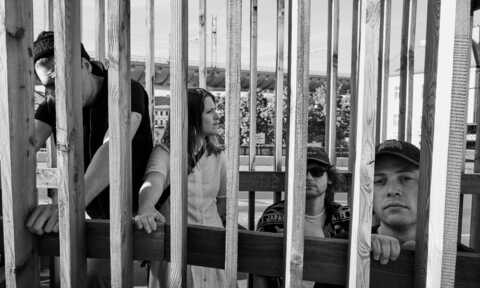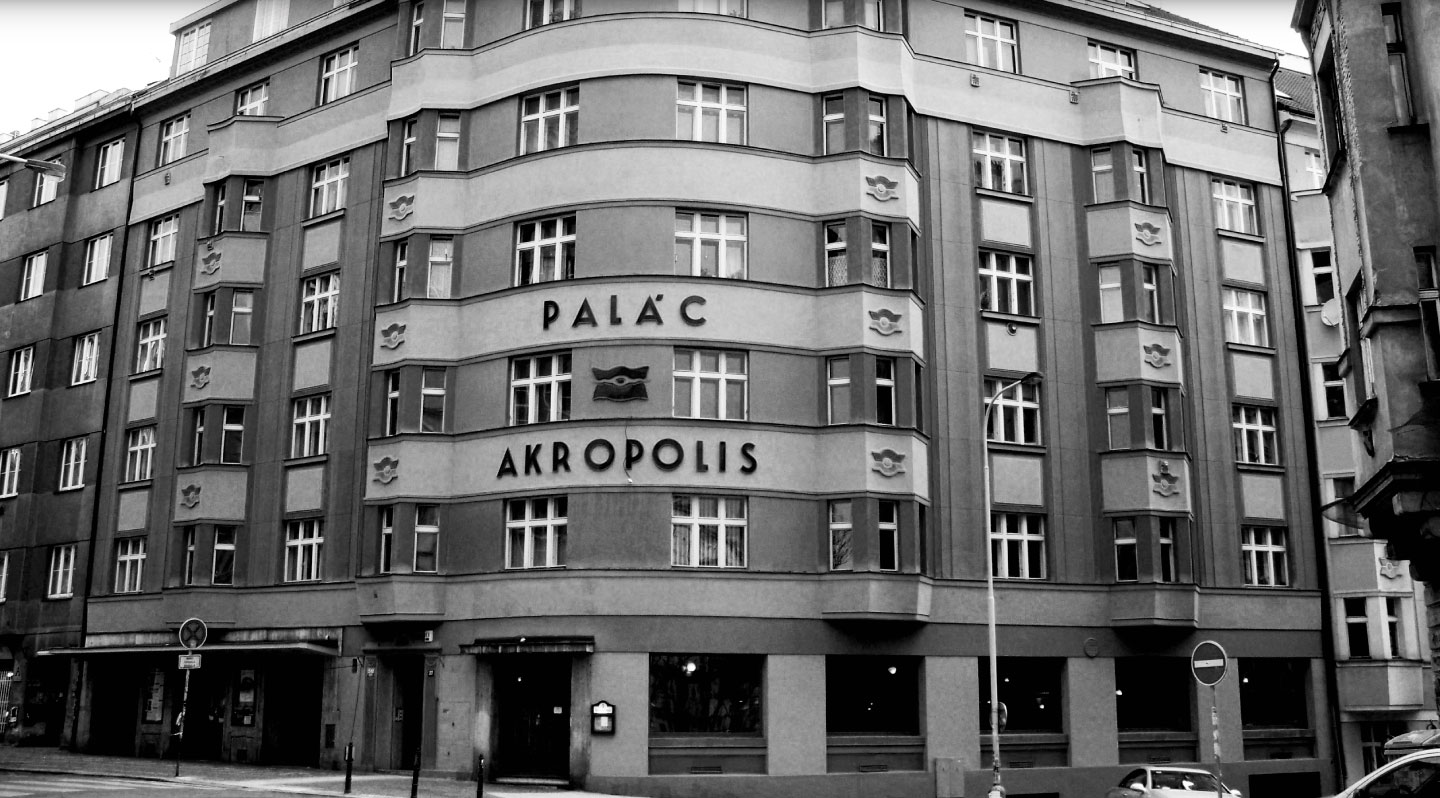|
Thursday 21. 1.
info Leading jazz personality from Belgium comes to Prague for the first time. Melanie De Biasio is a graduate of the Conservatoire Royal de Bruxelles and already an acclaimed artist in her home country of Belgium and in the neighbouring Francophone nation to the south. Initially heralded as a new voice in jazz, albeit jazz „d'autres univers“, other-worldly, so to speak, her first album „A Stomach Is Burning“ was closer to the smoky, smouldering sound you dream of stumbling upon in a jazz cellar. Preferably in Paris or New York in, let's say, 1959. „No Deal“, her sophomore album, appears almost monochromatically minimalist at first, A simple cover shot. Melanie has cut her hair. Miles Davis „A Kind Of Blue“ typography. Seven songs, through which her own voice drifts gracefully, at times disappearing altogether. Like a tintype photograph, this record needs time to develop, for the details to become clear, as if by magic. Apparently „No Deal“ comes in at 33 and a third minutes, which could be mistaken for a nod to the golden age of the jazz LP. And yet its brevity (or succinctness) is genuinely hard to believe. It reverberates, echoes resonates. Throw a stone into the lake and the concentric ripples seem to go on for ever. She has been called the Belgian Billie Holiday and, to be fair, there is something delicately haunting about her voice. Something in her delivery which compels you to listen, a different timbre to Abbey Lincoln but a similarly entrancing fascination. If the „No Deal“ LP does have an immediate relative in jazz, then perhaps it is Nina Simone's debut „Little Girl Blue“, also known as „Jazz As Played In An Exclusive Side Street Club“. On both, instrumental tracks nestle between the vocal ones. Nina plays the piano. Melanie plays the flute. There's Nina on the cover of „Little Girl Blue“ on a Central Park bench looking like there's definitely some other place she'd rather be. Melanie, half in shadow, looking up and away, breathes that same unpindownability. The first time I see Melanie De Biasio, light floods in through the angled window behind her, taking out the colour and blurring the edges like a soft focus shot from a black and white movie. You live under the roof, just like me, I say. „Always at the top. So we can see the horizon“ she says. Melanie's new horizon appeared to her in Portland, Maine. A poet friend of hers invited her over with a wonderfully conceived ulterior motive, creating an event in which she was to sing – in the shadows, almost – her own songs, but to accompany a dance performance, spoken word, painting, a proper „happening“. It opened up a new perspective on her music, how to break the traditional relationship of singer, band and audience. „It is not jazz“ Melanie tells me, (elsewhere she said „c'est pas vraiment du jazz mais c'est aussi du jazz“ – it's not really jazz, but jazz is a part of it). Coming up with a new way to play, she pauses before suggesting the name „evolutive pop“. So „No Deal“ draws you in, a stealth operation masquerading as a jazz album (which we have decided it isn't), directed by an elegant chanteuse (which she most definitely is). The album, she explains, is just one version of the songs, the formations in her live vary in number and composition. In all this, the voice is important, but, she maintains, in the bigger picture, it becomes less about the voice. Perhaps playing the flute gives Melanie a certain distance in this regard, but conversely, when she does sing, we listen all the more intently. „We don't have rehearsals, we just meet on stage and I say we're going to play this and this and this… we know each other really well. The sound engineer, the lighting engineer, they are part of the band. It's all about composing a vision and you are part of the process, c'est poreux… (permeable).“ Is there one song which holds the album together, I ask. One song which unlocks the rest? It was important to begin with „I Feel You“, she says. To set the tempo. „Tempo is so important. There is a story, but I wanted to create a record that allows you to dream, there needs to be space for this to happen.“ Indeed, it feels as if she is telling a story she herself drifts in and out of with ease. Allowing us time to figure out our own version of events. So when Melanie sings „I'm gonna leave you“ over and over, a mantra of resolve, the story I hear is of a girl who is not leaving anybody, even though she might think she is. If you are going to leave somebody, you just do it, right? You don't need to tell them again and again. „I like that idea, I haven't heard that one before, but it's nice to hear the different stories people come up with, of course I get asked about it, but is it my story,? That's not the point.“ Taking the album as a kind of shifting narrative, the eponymous track „No Deal“ is itself like a suite in three movements. The promise of a new wind sweeps through the first, followed by the uncompromising „No Deal“ of the central section (it lasts for barely a minute but boy, does it snare our attention) and then the final third… the final third slows us down into a state of contemplation. We keep waiting for her to come back. But she's gone. There is a red line running through the record, she says, but you create your own imagination. „I listen once, twice, it's not the same thing. You need that space. I was watching 'Ascenseur pour l'échafaud' and the music is so important, it sets the tempo, or you know 'Drive', the scenes where he is just riding around in his car, again the music is important, really great music, but the thing is it sets the tempo, it gives you time to think.“ Miles Davis wrote the music for 'Ascenseur pour l'échafaud' – what was it Miles said? Don't play what's there, play what's not there. So „No Deal“ becomes a kind of synecdoche for the entire album, which flows from the intimate beginnings of „I Feel You“ to the farewell note of „With All My Love“. The final song intimates the reconciliatory, redemptive powers of song, the calm after the storm, yet bristling with emotion, a 'frisson', as they say in French. „We'll make it through. That's what we do. With all my love.“ Still, we cannot be sure, As „With All My Love“ descends into a mesmerizing drone, has the curtain already fallen? Will our heroine still be there when the lights go up? She has us captivated then she walks away, she's left the door open but we cannot bear to leave. Put the needle back to the beginning. Rewind the tape. Click repeat, endless play. „I know you know“, she almost whispers on „I Feel You“, taking us back to another great movie, Coppola's „The Conversation“, a film all about listening carefully, how stories can be reinterpreted, given different meanings in different contexts. Our obsession with narrative understanding. A phone call to the protagonist/observer „We know that you know.“ Veteran American jazz DJ Dave Wade nicely described Melanie's lyrics as delphic and direct. Even when her voice disappears into the shadows and mesmeric piano and percussion guide us through to the end, we keep on listening so very closely. Hanging on every word. Consumed by hope. As Maurice Ronet said to his lover Jeanne Moreau in 'Ascenseur pour l'échafaud' Si je n'entendais pas ta voix, je serais perdu dans un pays de silence Without your voice, I'd be lost in a land of silence. |
|













